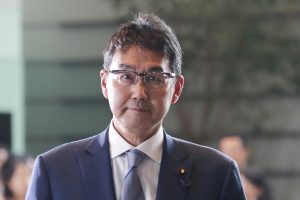Former Justice Minister Katsuyuki Kawai and his wife, Liberal Democratic Party (LDP) Diet member Anri Kawai, have been arrested on allegations of vote buying in last July’s upper house election for a Hiroshima constituency. Both are known to have close ties to Prime Minister Shinzo Abe.
It’s believed that Kawai paid a sum of 30 million yen ($280,000) in cash to 94 Hiroshima politicians, mayors, and supporters in exchange for their efforts to secure votes for his wife’s electoral campaign.
According to the Tokyo District Public Prosecutors Office, cash payments ranging from 50,000 yen ($470) to 100,000 yen were recorded as “donations” to support local legislators. But local media interviews have revealed that among the 40 Hiroshima local assemblymen who accepted the payments, a small portion were offered large sums on several occasions. The payments were concealed as customary election win “celebration cash” or election “support donations” before and after last year’s unified local elections in April and the upper house election in July.
Since October, Kawai and his wife have been at the center of an escalating political scandal putting the LDP in the spotlight for allegations of political misconduct once again. With an investigation still underway, many lawmakers are waiting to see if their names will be exposed and a resignation domino effect could be imminent. The arrests follow a series of public anger over the Abe administration’s handling of the coronavirus and its recent controversial attempts to extend the retirement age for senior LDP-approved public prosecutors. Over the weekend Abe’s approval rating stood at 36.7 percent, reinforcing the impact of the corruption scandal on the government’s reputation.
The Kawai couple is also suspected of destroying digital evidence, but group conversations showing incriminating instructions to election campaign staff were recovered on the messaging app Line. In January, several lists were also found detailing a record of cash payments. Although the majority of lawmakers questioned by the police have admitted to accepting bribes, both suspects denied the allegations during voluntary questioning. Through the couple’s respective lawyers, the former justice minister was quoted saying “I did nothing unlawful” while his wife maintained that “I have no recollection of doing anything illegal.” After growing internal pressure to leave the LDP, both offered their resignation on Wednesday but stopped short of relinquishing their Diet seats.
Authorities are investigating the whereabouts of a suspiciously large bank transfer of 150 million yen to cover campaign costs from the LDP headquarters to Kawai’s political faction, which is backed by Chief Cabinet Secretary Yoshihide Suga. In Hiroshima the LDP financial limit set for candidates participating in upper house elections is 47 million yen. Kawai’s funding was not only three times above the limit but was also 10 times over the amount received by another LDP candidate in the same electoral district. Authorities say over 100 million yen is unaccounted for after deducting campaign costs and leaflet printing.
LDP members have demanded answers on the source of the extra funds and how such a high amount came to be approved. Excessive funding not only points to suspicious special treatment but raises alarms on the validity of electoral results.
Katsuyuki Kawai served as Abe’s foreign affairs adviser followed by a six-week stint as justice minister in 2019, from September 11 to October 31, before suspicions of voter bribery were first leaked. LDP lawmaker and Abe critic Shigeru Ishiba, who is viewed as a potential successor to the prime minister, criticized Abe’s judgment in appointing Kawai to the senior cabinet post. Ishiba highlighted that because a justice minister is in charge of law enforcement, the post requires a higher standard of ethics and discipline than other ministers.
For Japan’s longest-serving prime minister, the scandal means further strain as an outgoing Abe moves to gain control of his political legacy and achieve his lifelong ambition of revising the war-renouncing article 9 of Japan’s constitution. At a press conference on Thursday Abe apologized for the arrest of a LDP former justice minister, conceding, “I am keenly aware of my responsibility.” A few days earlier he deflected any personal involvement by pressuring the couple to publicly own up to the scandal, saying, “Whether it’s the opposition or ruling party, when caught in a position of suspicion, diet members owe an explanation. This is the responsibility we bear.”
Newcomer Anri Kawai made her political debut last summer after winning her first seat in the Hiroshima prefecture number 7 constituency. But her husband, who spearheaded her election campaign and already held a seat in the Hiroshima number 3 constituency, lost his seat while ironically helping secure votes for his wife. Some argue the Abe administration was hoping to win the two open seats in the Hiroshima constituency for a LDP-backed two person monopoly.

































